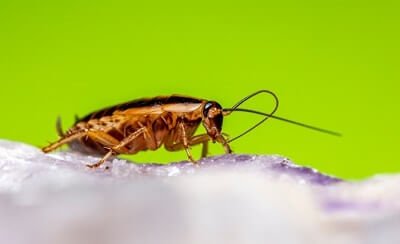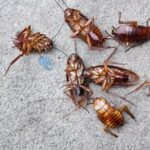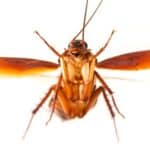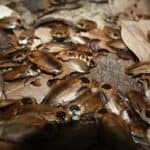Cockroaches produce a musty, oily smell. While it’s usually undetectable by humans, that changes if a cockroach colony is allowed to thrive unchecked. In certain numbers, you will be able to smell the presence of an infestation. The longer roaches are allowed to remain in your home, the more pungent this scent will become.
Roaches smell bad due to their pheromones, death stench, and the unsanitary environments they live in. Roaches use chemical scents to communicate where food, mates, water, and shelter can be found in abundance. They also release a death smell that warns other roaches to stay away from danger. Roaches can be found where damp, mold, mildew, and other unpleasant smells are most common. These foul odors could be accredited to them.
Removing cockroach smells from your home involves culling the entire population. After that, you’ll need to sanitize the area with chemical-strength products. You may need to throw away compromised food and furniture, as the smell, bacteria, and germs will permanently affect them. If allowed to remains, roaches’ bad smell will attract more roaches.
Do Cockroaches Make A Bad Smell?
The average cockroach does not produce a smell that’s easily detectable by humans. However, that doesn’t mean they don’t generate odors. In large quantities, people describe the smell as:
- Musty
- Oily
- Like rancid soy sauce
You won’t easily mistake this for other pests. Rats produce a very ammonia-heavy smell, and bed bugs are known for their sweet-smelling odor. Cockroaches will have a very dry, musty smell.
How Bad Do Cockroaches Smell?
One sign of a serious cockroach infestation is an unexplained stink. You may walk into an old house or a neglected basement and be overwhelmed by the odor.
However, you won’t find the smell arrives overnight. In fact, it may slowly grow over time, undetected as you live in your home. Then, one day, a guest may notice – or you will after being away for some time. That’s because the factors that intensify the smell don’t happen immediately.
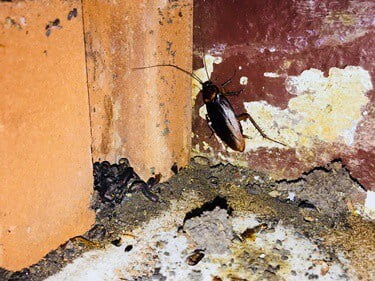
Many Live Cockroaches
As explained below, roaches use pheromones to communicate with each other. If you have a large colony in your home, this scent-talk may eventually build up. As you uncover a nest, you may be able to smell a pungent musty odor in that area. This is the case if you pry open their hidey-hole, such as:
- A pocket in your wall
- A box they’ve been nesting in
- Places beneath appliances or underneath cabinets
Many Dead Cockroaches
Roaches unleash a death scent when they die. This alerts any nearby roaches that danger is present. They can then stay away from these spots to avoid getting killed themselves. This odor is hard for humans to detect. However, if many cockroaches have been killed in one area, the scent may be sufficient for you to notice it.
Roaches That Are Thriving In Unclean Environments
It’s possible that you’re not smelling the roaches but the environments they love. These areas are often damp, dark, and prone to:
- Mold
- Mildew
- Accumulating other dead insects, which will rot
If a roach colony can thrive in this area, they’ll be coated in the damp or mold themselves. They can carry this into other areas of the home. In large populations, enough of the smell may be moved around that humans can detect it.
Roaches smell as bad as they’re allowed to smell. If they’re left to thrive, the odor will worsen. If they’re killed off entirely without the use of specialized chemicals, the death scent may quickly spread. That’s why it’s not everyone’s first approach to handle an infestation by stamping on cockroaches or by using a hammer.
What Causes A Cockroach’s Bad Smell?
Roaches themselves don’t automatically smell. In fact, if roaches are kept by themselves and not allowed to interact with their favorite smelly foods, like rotting animal carcasses, they’ll be virtually scent-free. In a home, that’s rarely going to be the case. Smells may accumulate for the following reasons:
Pheromone Communication
Cockroaches communicate with each other through the use of pheromones, as noted by Biological Sciences. These chemicals are called cuticular hydrocarbons. Since roaches have a powerful sense of smell and are small insects, they don’t need to release much to do the job. These pheromones will guide a colony to shelter, regulate mating, and warn of danger. However, these chemicals also leave scent trails.
Scent trails can permeate any surface or object they’re exposed to. They can even alter the taste of food, should a roach scent your kitchen leftovers. That can leave an area smelling bad. These trails lead new roaches to safe havens, food, mates, and water. Such trails will be detected by other cockroaches, drawing more pests into your home.
The more cockroaches inhabiting a single location, the stronger the chemical scents become. Individual cockroaches may not leave trails detectable by humans. Small colonies will begin to create an odor radius. The more widespread the infestation, the larger the radius, or the greater number of radiuses in the home.
Death Scents
Cockroaches release a chemical odor when they’re killed. Unlike bees, it doesn’t indicate that nearby insects and members of their species should become aggressive. It warns all who detect it that they should run for safety. McMaster University notes that cockroaches actively avoid corpses or areas doused with these chemical scents.
The researchers concluded that it likely hinted at the threat of predators, toxic substances, or other deadly elements. One or two roaches cannot release enough of this chemical to alert a human unless your face is inches from the roach. However, if a large batch dies, you may find that the odor builds. The spots may smell musty or oily over time.
Should the body be left, a new problem occurs. Cockroaches will rot, leading to the smell of decay. Other insects may overcome the warning chemical if given enough time. They will then be attracted to the smell of free food in the form of a dead roach.
In fact, certain kinds of toxic bait rely on cannibalism as a method of spreading poisons to other cockroaches. As found by a study in the Journal of Economic Entomology, cockroaches will eat contaminated cockroach nymphs, which are newly hatched cockroaches.
Molts And Feces
Roaches unleash most of their pheromone indicators through feces. The poop itself will smell unpleasant but be hard to notice by humans. The same goes for the pheromones in them. That only changes when a great deal of poop is allowed to accumulate.
When a cockroach molts, it will also leave its wasted exoskeleton behind. This is odorless but is still biomass. When it rots, a limited odor will start to attract other bugs. This can lead them to infest the area, leaving their own smells and droppings behind.
If roaches can defecate and molt in an area for a long time, the smell may grow. This can help you locate nests or preferred shelters by the colonies. Once you open up a spot, like a hidey-hole in an old box, you may be overcome by a strong, musty smell.
Their Preferred Environments
Roaches like damp, dark, musty areas. This can include:
- Basements with leaky pipes
- Cardboard boxes with water damage
- Underneath sinks
- Drains
Bathrooms that aren’t regularly cleaned are also ideal. These spots will be well-loved by mold and mildew, which create a strong odor. Since roaches are attracted to these spots, you may confuse the smell of roaches with the smell of:
- Mold
- Dampness
- Mildew
- Rot
These insects may even let mold grow on their backs and carry it into new areas. They’ll feast on mildew and chew at rotten areas that have been softened by mold. If you notice that smell, you can consider it part and parcel of a roach’s smell. The cockroaches may not cause it, but that’s irrelevant.
Do Cockroaches Smell Like Urine?
Roaches themselves do not produce any smells that are comparable to urine. However, you may confuse the smell of mildew or rot with urine.
The cockroaches may also be coated in urine. Since these pests have no issue walking through unclean areas, there’s no telling what covers their body. They may have infested a pet’s litter box and be eating feces. If you smell strong urine, be sure to check the area for:
- Rotting food
- Exposed waste, like a spilled litter box
- Areas that may have mold or leaks, such as under the sink.
Do Roaches Smell Like Cat Urine?
Cat urine is a notoriously strong odor, which should catch your attention right away. That’s even more true when you don’t own a cat and are struggling with roaches.
The roaches may have made contact with cat urine outside your home. If it’s just 1-2 roaches, the odor should be too light to detect. If a colony has walked through urine, then they’ll spread it onto other surfaces. Roaches are resilient against all bacteria, so there’s no real reason for the urine to be washed off.
Aside from that, several kinds of mold produce a smell that’s similar to cat urine. It could be a sign of black mold. This is a toxic substance that will cause long-term damage to people and property alike.
When coated in the spores of black mold, they can carry it around your home. This will not only spread your mold problem but enable the roaches to thrive.
Do Cockroaches Smell Like Fish?
Roaches should not smell like fish. However, some people mistake this smell due to their frame of reference. As mentioned, cockroaches’ musty odor can be similar to soy sauce if that soy sauce has gone rancid.
That’s a household condiment used in Asian cuisine or with sushi. Because of this, most people might smell ‘bad soy sauce’ and think ‘bad fish in the house.’ Roaches themselves are not fishy. However, in line with the common theme so far, there may be cockroach-friendly problems in your house creating a fish smell:
- Certain kinds of mold can produce a fishy odor—roaches like mold.
- Dead animals, depending on their state of decay, may smell fishy. Roaches will eat rotting carcasses.
- Sewer gases can create a fish smell, and roaches can come from your sewer. These gases being released into your home may indicate a septic tank issue that roaches are exploiting to gain entry.
Do Cockroaches Smell When You Squish Them?
Roaches will produce a death stench accompanied by a white, milky liquid if they’re crushed. While some people think it’s the ‘juice’ that creates the death smell, that’s not the case. It’s their blood, which is odorless.
Instead, a chemical acid will be released upon death. In rare cases, or if you specifically sniff around for it, you may notice this odor. The specific acids responsible for this are oleic acids or fatty acids.
Crushing the exoskeleton will also expose these acids to the air faster. If you step on a roach and then smear it, the smell will grow stronger. On the one hand, that’s a good way to scare off more roaches temporarily.
Even if a cockroach dies of old age, its decaying body will still release oleic acids. Unless the corpse is removed and surfaces sanitized, the smell will remain. Removing dead cockroaches on sight prevents the smell from becoming ingrained in any surrounding objects or surfaces.
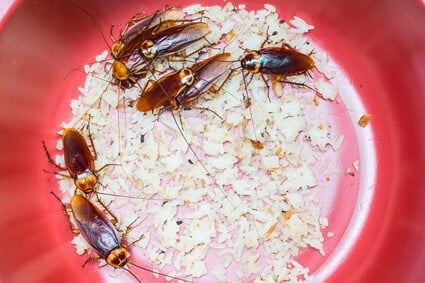
How To Get Rid Of Cockroach Smell
When tackling cockroach odor removal, you need to be thorough. Even if you have eradicated the infestation, the stink of cockroaches will still linger. That’s especially true if it was a long-standing population.
If left alone, the smell will eventually attract more roaches and create the same problem once again. That’s not to mention the unpleasantness of living in those conditions yourself. You can take these steps.
Pest Control
Most pest control companies will remove dead cockroaches from your property. They can also sanitize the area and lay down repellents to deter any new, opportunistic roaches.
Remove The Bodies
However, if you don’t want to pay a pest control company, there are DIY solutions. The key will be to purge any evidence of the old colony. Any remaining corpses should be cleaned up and disposed of with haste. Here’s how:
- Wear gloves and a mask. The insecticides or the dead roaches may irritate the skin or trigger breathing issues.
- If you put the corpses in the trash, immediately take out the trash to be disposed of by your garbage service.
- If you flush roaches down the toilet, be sure they’re dead, and then clean the toilet as well.
If you crushed the roaches, this should include any stray limbs, exoskeletons, or antennae. Nothing should be left behind or considered too minor.
Vacuum The Floors, Cupboards, Shelves, And Furniture
Clean up any droppings and molted shells as these can all leave smells behind. A vacuum is recommended to suck up any remnants. A broom or mop may only spread the foul odor around. Run your vacuum along:
- The tops of cupboards and inside drawers
- Along the top of shelves
- Under and behind all furniture and electrical appliances
Even a few traces could encourage new roaches to appear.
Throw Away Roach Shelters
Any items that the cockroaches were living in or near should be disposed of. This may include:
- Boxes
- Plastic containers
- Bedding or clothes
- Bags
Disinfect
Anything left or anything which can’t be disposed of should be washed with chemical-strength disinfectants. Bleach can be used in kitchen areas or places where color damage isn’t an issue. For cloth or furniture, you can use pet-safe sprays or sanitizers. Here’s how:
- Spray down areas where the cockroaches lived with a disinfectant
- Let it sit for 10-15 minutes
- Wipe everything down and repeat if necessary
It’s recommended to air the space out once you’re finished. The overpowering scent of disinfectant will be helpful against roaches, but you shouldn’t harm yourself.
Shampoo And Scrub
If you have carpets or rugs, source a cleaner for these surfaces that will do the job. As the cockroach stink can embed itself on surfaces, you may have to permanently dispose of some objects if the stench can’t be lifted.
Remove Attractants
Getting rid of cockroach smells also involves preventing new roaches from settling in your home. This involves getting rid of any chemical trails with the above methods and also making your home unattractive to visiting pests.
To do this, you need to deprive the cockroaches of food, water, and places to nest in. Regularly removing trash and cleaning bins of food scraps is also important.
Throw Out All Contaminant Food
Given that the cockroach smells can infect food and alter its taste, we recommend throwing all contaminated food away. Not doing so can pose a serious health risk.
While the scent markings themselves may not be deadly, it indicates roaches were crawling through the food. The bacteria that coat them can prove lethal, especially to people in risk groups.
Do Cockroach Scents Fade?
In theory, cockroach scents should fade in time as they’re not strong enough to last forever. However, if you leave a bad cockroach smell in your home, you will attract more cockroaches.
Depending on the severity of the infestation, wallpaper and even drywall segments may need to be removed and replaced. Wood soaks up chemical scents, so removing cockroach stench can be expensive.
Once a cockroach begins leaving scent markings, others will arrive. These smells are not known to be hazardous, but they are unpleasant. Stripping these chemical trails from your home requires intensive cleaning and sanitization. Of course, this all begins with getting rid of the cockroach infestation.
